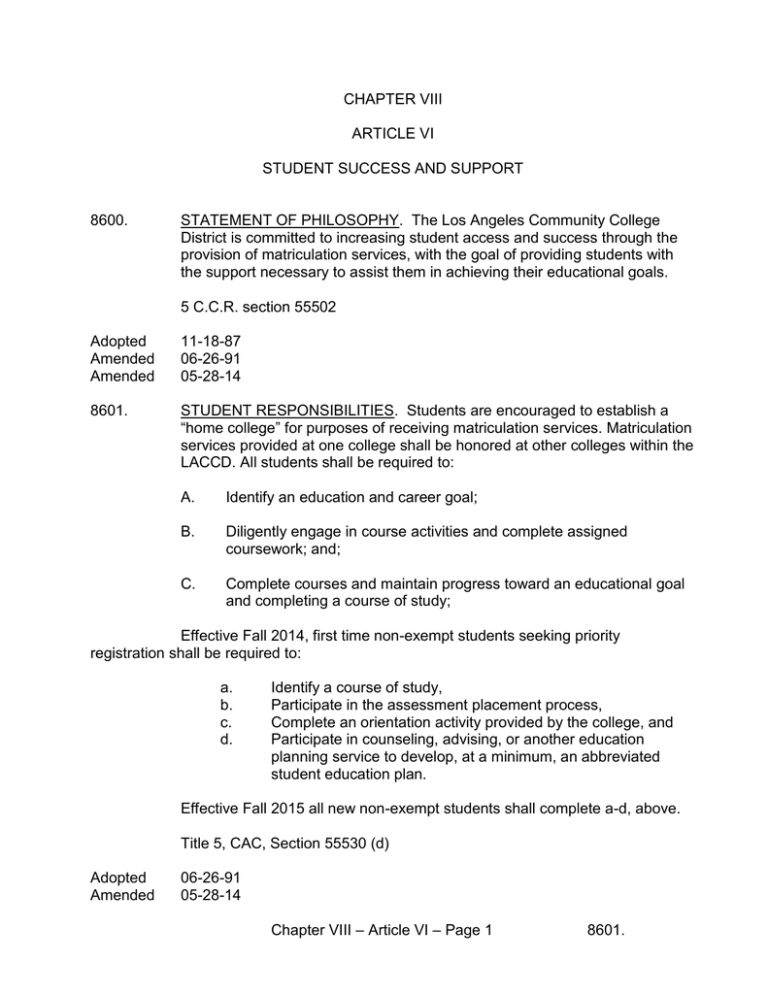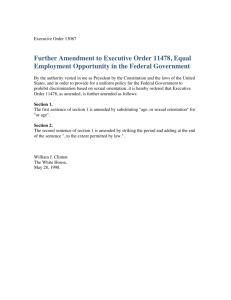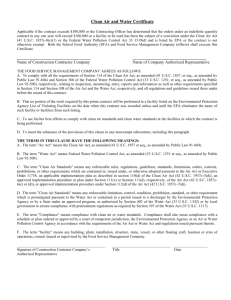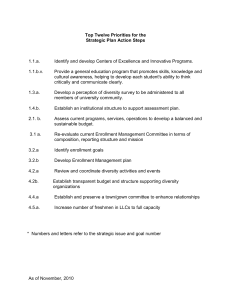CHAPTER VIII ARTICLE VI STUDENT SUCCESS AND SUPPORT
advertisement

CHAPTER VIII ARTICLE VI STUDENT SUCCESS AND SUPPORT 8600. STATEMENT OF PHILOSOPHY. The Los Angeles Community College District is committed to increasing student access and success through the provision of matriculation services, with the goal of providing students with the support necessary to assist them in achieving their educational goals. 5 C.C.R. section 55502 Adopted Amended Amended 11-18-87 06-26-91 05-28-14 8601. STUDENT RESPONSIBILITIES. Students are encouraged to establish a “home college” for purposes of receiving matriculation services. Matriculation services provided at one college shall be honored at other colleges within the LACCD. All students shall be required to: A. Identify an education and career goal; B. Diligently engage in course activities and complete assigned coursework; and; C. Complete courses and maintain progress toward an educational goal and completing a course of study; Effective Fall 2014, first time non-exempt students seeking priority registration shall be required to: a. b. c. d. Identify a course of study, Participate in the assessment placement process, Complete an orientation activity provided by the college, and Participate in counseling, advising, or another education planning service to develop, at a minimum, an abbreviated student education plan. Effective Fall 2015 all new non-exempt students shall complete a-d, above. Title 5, CAC, Section 55530 (d) Adopted Amended 06-26-91 05-28-14 Chapter VIII – Article VI – Page 1 8601. Effective Fall 2015, all non-exempt students shall develop a comprehensive education plan after completing 15 units of degree applicable course work, or prior to the third semester of enrollment, whichever comes first. Failure to comply with the requirements, above, may result in a hold on the student’s registration and/or loss of registration priority until the services are completed. REGISTRATION PRIORITY Students may register for no more than 19 units per semester (primary terms of Fall and Spring), and no more than 9 units during the Winter and Summer sessions. Students in good academic standing shall be granted registration priority on the basis of cumulative units completed within the LACCD in the order listed below, from highest to lowest: 1. New and fully matriculated students as follows: ■ Members of the armed forces or veterans pursuant to Education Code 66025.8, ■ CalWORKs recipients in good standing with fewer than 100 degreeapplicable units, ■ Disabled Student Programs and Services (DSPS) students in good standing with fewer than 100 degree-applicable units, ■ Extended Opportunity Programs and Services (EOPS) students in good standing with fewer than 100 degree-applicable units, and ■ Foster youth or former foster youth, pursuant to Education Code section 66025.9 regardless of academic standing and units taken. 2. Continuing students in good standing with fewer than 100 degreeapplicable units, middle college students in good standing with fewer than 100 degree-applicable units, new, fully matriculated students, returning exempt students and new students who are exempt from matriculation. 3. Students who have lost their enrollment priority, as set forth below. 4. Special K-12 admits pursuant to Education Code section 76001. To be eligible for registration priority as listed above, students must have completed orientation, assessment, and developed student education plans. Title 5, CAC, Section 55530 (d) Adopted Amended 06-26-91 05-28-14 Chapter VIII – Article VI – Page 2 8601. LOSS OF REGISTRATION PRIORITY Students, with the exception of foster youth or former foster youth, will lose registration priority at the first available registration after: a. They are placed on academic or progress probation, or any combination thereof, for two consecutive terms. b. Have earned one hundred (100) or more degree-applicable units in the District; however, non-degree applicable basic skills units do not count towards the 100 units. Appealing Loss of Registration Priority Each college shall establish a Registration Priority Appeals Committee to review requests from students appealing the loss of enrollment priority. Colleges shall inform students of the appeals process and the time period by which appeals must be submitted. A student may appeal on one or more of the following grounds: a. The student has extenuating circumstances. Extenuating circumstances are verified cases of accidents, illnesses or other circumstances beyond the student’s control. b. The student applied for reasonable accommodation for a disability, but did not receive it in a timely manner. c. The student has demonstrated significant academic improvement. Significant academic improvement is defined as achieving no less than a 2.0 grade point average in the prior term. The College’s Registration Priority Appeals Committee shall notify the student within ten (10) business days of its decision. The decision of the college Registration Priority Appeals Committee shall be final. Title 5, CAC, Section 55530 (d) Adopted Amended 06-26-91 05-28-14 8602. EXEMPTIONS. Colleges shall exempt any student from participation in orientation, assessment, counseling or advisement who: A. Has completed an associate degree or higher, or Title 5, CAC, Section 55532 Adopted Amended Amended 06-26-91 10-20-99 05-28-14 Chapter VIII – Article VI – Page 3 8602. B. Has enrolled at the college solely to take a course that is legally mandated for employment or necessary in response to a significant change in industry or licensure standards, or C. Has enrolled at the college as a Special Admit student. Any student exempted in accordance with this section shall be notified that he or she is exempted from participating in all or part of the matriculation process, and shall be given an opportunity to choose whether or not to participate. Title 5, CAC, Section 55532 Adopted Amended Amended 06-26-91 10-20-99 05-28-14 8603. LIMITATIONS ON ENROLLMENT. All courses shall be open to enrollment, however, enrollment in specific courses or programs may be limited as follows: (a) Students meeting prerequisites and corequisites established pursuant to Title 5, and Board Rule 8600. (b) Health and safety considerations, facility limitations, faculty workload, the availability of qualified instructors, funding limitations, the constraints of regional planning or legal requirements imposed by statutes, regulations, or contracts. Fair and equitable procedures will be used for determining who may enroll in affected courses or programs. Such procedures shall be consistent with one or more of the following approaches: 1) Limiting enrollment to a “first-come, first-served” basis or 2) Limiting enrollment using a registration procedure authorized by Title 5, section 58108; or 3) In the case of intercollegiate competition, honors courses, or public performance courses, allocating available seats to those students judged most qualified; or Adopted Amended Amended Amended Amended 06-26-91 04-14-99 06-23-99 01-24-07 05-28-14 Chapter VIII – Article VI – Page 4 8603. 4) Limiting enrollment in one or more sections of course to a cohort of students enrolled in one or more other courses, provided however, that a reasonable percentage of all sections of the course do not have such restrictions. 5) Students on probation or subject to dismissal, consistent with the provisions of Title 5, and Board Rule 8200 et seq., may be limited to enrollment in a total number of units or to selected courses, or required to follow a prescribed educational plan. Adopted Amended Amended Amended Amended 06-26-91 04-14-99 06-23-99 01-24-07 05-28-14 8604. CHALLENGES TO LIMITATION ON ENROLLMENT. A student may challenge an enrollment limitation on any of the following grounds: 1) The enrollment limitation is either unlawfully discriminatory or is being applied in an unlawfully discriminatory manner; 2) The District is not following its policy on enrollment limitations; or 3) The basis upon which the District has established an enrollment limitation does not in fact exist. The student shall bear the burden of showing that grounds exist for the challenge. Challenges shall be addressed within 5 working days and, if the challenge is upheld, the enrollment limitation shall be waived. The college shall, upon completion of the challenge, advise the student that he or she may file a formal complaint of unlawful discrimination pursuant to Title 5, California Code of Regulations, section 59300 et seq. Completion of this challenge procedure shall be deemed to satisfy the requirement of Title 5, California Code of Regulations, section 59328(b) that the District and the student attempted to informally resolve the complaint. Adopted Amended Amended 06-26-91 09-03-03 05-28-14 Chapter VIII – Article VI – Page 5 8604. 8605. PREREQUISITES, COREQUISITES AND ADVISORIES A prerequisite is a condition of enrollment that a student is required to meet in order to demonstrate readiness for enrolling a course or educational program. Corequisities are courses that a student is required to take simultaneously in order to enroll in another course. An advisory is a course that a student is advised, but not required, to take in conjunction with, or prior to, a course or program. Colleges shall ensure that course pre and corequisites are properly validates pursuant to Title 5, Section 552001, and Board Rule 8600 et seq. Adopted Amended 08-31-94 05-28-14 8605.10 College Policies and Procedures. Provision of Information Colleges shall provide information in the Catalogue, Schedule of Classes and website on the definitions of prerequisites, corequisites and advisories as well as any other limitations on enrollment. Information shall also be provided on the procedures for challenging the prerequisites or corequisites, and the right of students to choose a course without meeting the advisory. Challenge Process Colleges shall establish procedures by which any student who does not meet a prerequisite or corequisite, or who is not permitted to enroll but who provides satisfactory evidence, may seek entry into the class according to an established challenge process per the provisions of Section 55201(f) of Title 5. In the case of a challenge because the student believes that the prerequisite or corequisite is either unlawfully discriminatory or is being applied in an unlawfully discriminatory manner, the college shall promptly advise the student that he or she may file a formal complaint of unlawful discrimination pursuant to subchapter 5 (commencing with section 53900) of chapter 10 of Title 5, CCR. Adopted Amended Amended 08-31-94 05-26-10 05-28-14 Chapter VIII – Article VI – Page 6 8605.10 If the student elects to proceed with the challenge, completion of the challenge procedure shall be deemed to constitute an informal complaint pursuant to Title 5, section 59327. Colleges shall enforce all conditions a student must meet to be enrolled through the registration process, so that a student shall not be permitted to enroll unless he or she has met all required conditions except those for which he or she has a pending challenge, or for which further information is needed before a final determination is possible. Role of the Curriculum Committee The District and Colleges Curriculum Committees, established pursuant to Section 55002(a)(1) of Title 5, shall: 1) Establish prerequisites, corequisites and advisories on recommended preparation and limitations on enrollment pursuant to Sections 55002, 55201, and 58106 of Title 5 and Section I.C.3 (1-4) and II.C of the District Policy. 2) Verify and provide documentation that prerequisites or corequisites meet the scrutiny specified in one of the measures of readiness outlined in Section 55201(b)(1) of Title 5. 3) Adopted Amended Amended Provide for a review of each prerequisite, corequisite, or advisory at least every six (6) years pursuant to Title 5. Any prerequisite or corequisite that is successfully challenged shall be reviewed promptly thereafter to assure that it is in compliance with all other provisions of the law. 08-31-94 05-26-10 05-28-14 Chapter VIII – Article VI – Page 7 8605.10



